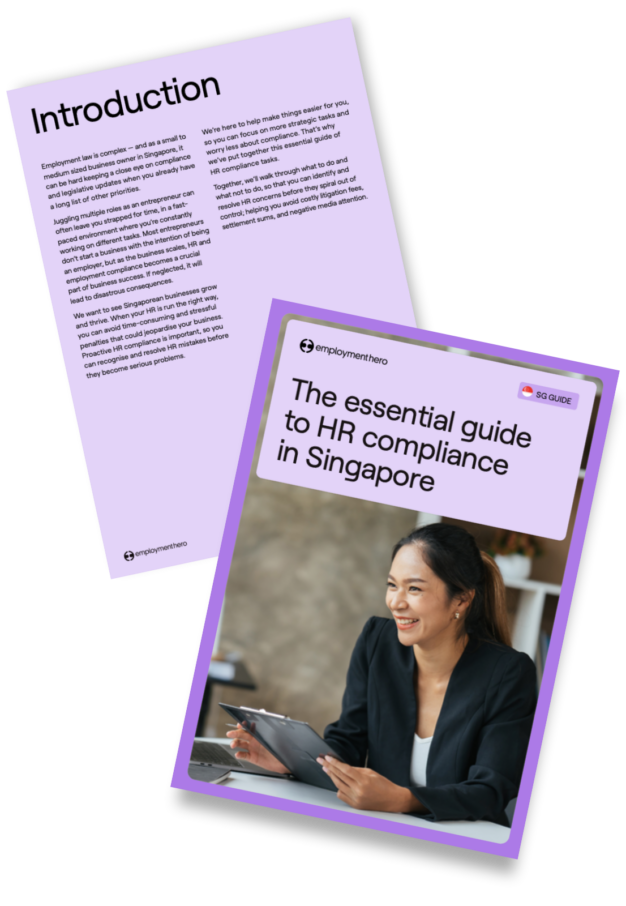Singapore employment law is complex — and as a small to medium sized business owner in Singapore, it can be hard keeping a close eye on HR compliance and legislative updates when you already have a long list of other priorities.
We want to see Singaporean businesses grow and thrive. When your HR is run the right way, you can avoid time-consuming and stressful penalties that could jeopardise your business. Proactive HR compliance is important, so you can recognise and resolve HR mistakes before they become serious problems.
We’re here to help make things easier for you, so you can focus on more strategic tasks and worry less about compliance issues. That’s why we’ve put together this essential guide to HR compliance tasks and employment law for HR professionals.
What is in this HR compliance guide?
This HR compliance guide covers the following:







Download our HR compliance handbook now.

What does HR compliance mean?
HR compliance is essentially a commitment by a business to follow the working standards set out by employment laws in a respective city, state or country. Whilst businesses must follow these laws to maintain HR compliance, managing multitudes of employees in accordance with these laws can be challenging.
Creating contracts in line with legal and regulatory requirements, wage and hour laws, and all other applicable laws are an essential part of HR compliance. They ensure employees understand, acknowledge, and comply with laws throughout their employment period.
HR compliance also entails staying updated on any employment law changes. HR professionals must stay abreast on all laws applicable to them and HR compliance best practices.
Is the HR department responsible for compliance with local laws?
A HR department has many responsibilities — from recruiting to onboarding, employee training and development, but most importantly, their role is to help the company maintain legal compliance.
Compliance is definitely one of the most critical functions of any HR department. They are responsible for making sure that the organisation has fair practices in the hiring process and treatment of employees, setting necessary workplace rules, making sure employees receive their contractual and statutory workplace entitlements, and basically all other aspects comply with local employment laws.
HR departments are also responsible for creating and maintaining employee handbooks or policies, for full transparency on employer and employee roles and responsibilities. They should also be constantly reviewed and updated to reflect any changes in the regulatory landscape or business needs.
But the onus isn’t entirely on the HR department per se. Business owners play a critical role in HR compliance too. Ultimately, they are responsible for implementing compliance practices and steering the direction of HR teams. If business owners aren’t aware of their responsibilities, HR leaders will struggle in their roles to maintain compliance.
What are the important employment laws in Singapore?
The Employment Act is Singapore’s main labour law and acts as a source of truth for all things related to employment in Singapore. It dictates the basic terms and conditions for employment under a contract of service (with some exceptions included).
Other important sources of employment law include:
- Trade Unions Act (1940)
- Trade Disputes Act (1941)
- Central Provident Fund Act (1953)
- Employment Agencies Act (1958)
- Industrial Relations Act (1960)
- Employment of Foreign Manpower Act (1990)
- Retirement and Re-employment Act (1993)
- Child Development Co-Savings Act (2001)
- Workplace Safety and Health Act (2006)
- Protection From Harassment Act (2014)
- Foreign Employees Dormitories Act (2015)
- Employment Claims Act (2016)
- Work Injury Compensation Act (2019)
What are the most common HR compliance issues?

HR compliance issues come in all shapes and forms, and more often than not, they are dependent on the size of the organisation, the industry it operates in, and employee behaviour.
Discriminatory hiring practices
In a multiracial country like Singapore, ensuring equal employment opportunities to all and having a fair and transparent hiring process are important. Although there are no specific laws in Singapore which directly regulate workplace discrimination, employers are expected to abide by the Fair Consideration Framework, and adhere to the Tripartite Guidelines on Fair Employment Practices.
There has been a significant increase in the number of cases regarding discriminatory hiring practices, with The Tripartite Alliance for Fair and Progressive Employment Practices (TAFEP), the national watchdog on fair employment, investigating about 400 cases annually. About 60% of these cases are nationality-based, while others are usually based on age, gender, race and language, marital status and family responsibilities, religion, and disabilities.
Some employers guilty of this had their work pass privileges suspended, which translates to the Ministry of Manpower (MOM) barring them from hiring new foreigners, or renewing the work passes of existing foreign staff for a period of time.
The government can also choose to rescind preferential tax benefits, disallow them from winning public sector contracts, or publish a list of recalcitrant firms that repeatedly fail to prohibit discrimination-based practices. HR compliance plays a key role in ensuring that a business adheres to anti discrimination guidelines (as Singapore does not have anti-discrimination laws at the moment).
Wrongful dismissals
According to the latest Employment Standards Report released in July 2021, a total of 1,319 wrongful dismissal claims were lodged with the Tripartite Alliance for Dispute Management (TADM) in 2020.
Although about 12% are unsubstantiated, they often arise due to poor communication from employers, and the lack of more robust grievance handling processes. Many of these wrongful dismissal claims were submitted by terminated employees who were unhappy over how they were let go so abruptly in the midst of the pandemic.
The HR department is essential in ensuring that employees are not let go unfairly, but have their employment contracts terminated in accordance with employment law. HR compliance helps mitigate any risks, penalties, fines and scandals that could arise from a wrongful termination.
Maternity discrimination

Despite the fact that it is unlawful for employers to dismiss an employee on the grounds of pregnancy, cases of maternity discrimination persist in Singapore. Apart from wrongful dismissals, other types of maternity discrimination include:
- Being passed over or held back from a promotion after going on maternity leave;
- Being paid less than male counterparts because that is the ‘market rate’ for women;
- Being passed over for a role based on a claim that it is physically demanding and the employee in question was unwilling to commit to the job;
- Being passed over in the hiring process, because prospective employers may assume that female employees will likely get pregnant and be absent from work after getting married recently.
Although Singapore does not have anti-discrimination laws at the moment, the government intends to enshrine existing workplace anti-discrimination guidelines into law.
Salaries owed to employees
According to the Employment Standards Report 2021, there were about 4,848 salary claims lodged in 2021. A large proportion of the claims were over basic salary payments, in addition to salary-in-lieu of notice, encashment of unconsumed annual leave, and salary for overtime work.
95% of employees managed to recover their full salaries after getting their claims resolved at the Tripartite Alliance for Dispute Management or the Employment Claims Tribunal (ECT). As for employers who did not fully repay their employees, their work pass privileges were suspended by the MOM.
Less than 1% of the salary claims lodged in 2021 involved employers who refused to make full payment for the salary arrears, despite having the means to do so. They are hence subject to MOM investigation and prosecution.
Is there a minimum wage in Singapore?

Unlike many other countries, Singapore does not have a minimum wage, but has a Local Qualifying Salary, and a Progressive Wage Model instead. The Ministry of Manpower believes that wages are best determined by market demand and supply for labour, so employees should be paid based on their skills, capabilities and competencies, rather than a fixed rate.
Best way to keep up with HR compliance
Businesses constantly face compliance challenges, and keeping up with changes to existing laws and regulations can be taxing. Why not find a better way to maintain HR compliance, by utilising HR cloud software?
Help your organisation stay compliant with local regulations by having processes streamlined and all your confidential documents stored digitally — from employee contracts to policies, performance and leave management, payslips and more.
Let us help you take the guesswork out of HR compliance, by efficiently checking on areas at risk so you can address them before they become a problem.
 Shiok lah, we’re officially an IMDA pre-approved solution! Get up to 50% PSG support today. Find out more
Shiok lah, we’re officially an IMDA pre-approved solution! Get up to 50% PSG support today. Find out more 



